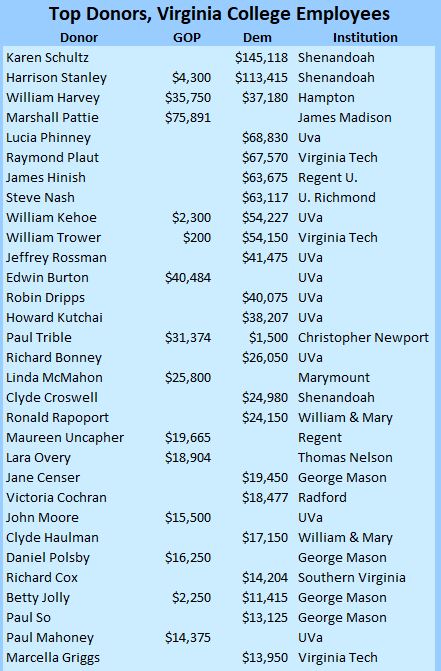How thoroughly dominated are America’s institutions of higher education by faculty and staff hewing to the left side of the political spectrum? In a survey of 12,372 professors, finds a new National Association of Scholars study, 48.4% are registered Democrats and 5.7% are registered Republicans. The ratio of Democratic to Republican donors was even more one-sided, about 95 to one.
The study breaks down the ratios for individual universities. Unfortunately, none are Virginia institutions because the Old Dominion is not one of the states that requires voters to register with a political party. So, I did a quick-and-dirty search on the Virginia Public Access Project database to list all public and private university employees who have donated $10,000 or more to either Republicans and/or Democrats over the past 20 years. (If someone wants to plow through the full universe of donors, not just the biggest donors, be my guest. I’ll be happy to publish what you find.)
The results suggest that Virginia higher-ed faculty and staff, though heavily skewed to Democrats, are less lopsided than the colleges and universities covered in the NAS study – a Dem/GOP ratio of only 3.5-to-one by dollars donated, and less than 3 to one in the number of donors.
Why is this important? By the standards of the energy industry, the environmental movement, the health care sector, and various single-issue groups, university faculty and staff are relatively small potatoes. (This list spans 20 years.) To understand the political economy of Virginia — who dominates the commanding heights of our culture — it’s not the modest amount of campaign contributions that matters, it’s knowing who is teaching the next generation of business, civic and political leaders.
In my humble estimation, American higher-ed has incubated many of the most destructive notions infecting the country — a veritable Wuhan of virally spreading memes — and there is ample evidence that these ideologies have taken root at Virginia higher-ed institutions. But the (admittedly cursory) evidence suggests that Virginia colleges and universities may be less orthodox and dogma-driven than their counterparts in other states. The finding that Virginia is different is reinforced by my own favorable experience at the University of Virginia — admittedly, we’re talking about a world that existed more than 40 years ago — as well as my acquaintance with two of the donors on the list (both of whose work has been discussed on this blog) who assuredly do entertain diverse points of view.
The National Association of Scholars study finds that the Dem/GOP registration ratio is most disproportionate in the Northeast — twice the ratio as in the South. And it finds that certain disciplines are more skewed than others — anthropologists by 42 to one, sociologists and English profs by 27 to one, but economists only three to one and chemists 4.5 to one. If you think college professors are skewed in their political loyalties, you ain’t seen nothing until you’ve checked out VPAP’s list of artists and authors!
Come to think of it, I think I’ll blog about them next.
